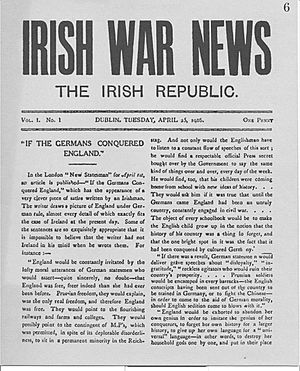Hibernian Rifles facts for kids
The Hibernian Rifles was a small Irish nationalist group that formed in Ireland in the early 1900s. Their main office in Dublin was at 28 North Frederick Street. At first, most of their members were Roman Catholic, but later they welcomed people of any faith.
The Hibernian Rifles were active in Dublin during the Easter Rising in 1916. In a newspaper called Irish War News, Patrick Pearse thanked the Hibernian Rifles for their help during the Rising.
Contents
How the Hibernian Rifles Started
The Hibernian Rifles came about because of a disagreement within a larger group called the Ancient Order of Hibernians (AOH). The Rifles were the military part of the Ancient Order of Hibernians (Irish-American Alliance). This group had separated from another part, the Ancient Order of Hibernians (Board of Erin), around 1907.
Many members of the Irish-American Alliance were in the United States, where they were influenced by a group called Clan-na-Gael. The Irish-American Alliance said they were against the "narrow religious views" of the Board of Erin. John J. Scollan, who was the leader of the Rifles, once gave a speech where he said he hoped to see the British flag taken down and the flag of an independent Irish Republic flying proudly over Ireland.
What the Rifles Did in Ireland
Helping During the Dublin Lockout
During the 1913 Dublin Lockout, which was a major strike, the Hibernian Rifles members in Ireland collected money to help those who were struggling. Money was also raised in the United States to support people affected by the strike.
Working with Other Groups
The Hibernian Rifles became friends with the Irish Citizen Army, which was started by James Connolly. Some members of the Rifles even joined the Irish Citizen Army. This was often mentioned in The Irish Worker newspaper.
Even though the Hibernian Rifles wanted to work with other nationalist groups, the Irish Republican Brotherhood (IRB) didn't seem to fully trust them. Because of this, the Rifles had to get some of their guns from James Connolly. They also bought some guns from British soldiers.
The Irish Volunteers group did not allow the Hibernian Rifles to join them as a full unit. They also didn't allow the Irish Citizen Army to join as a unit. However, the Rifles and Volunteers were able to work together in a friendly way, mostly thanks to Thomas MacDonagh. He likely helped them take part as a group in the funeral of Jeremiah O'Donovan Rossa. The Rifles also let the Volunteers use their headquarters at 28 North Frederick Street.
In 1915, the Hibernian Rifles started their own weekly newspaper called The Hibernian. At that time, some politicians, led by John Redmond, made fun of nationalist newspapers by calling them "the mosquito press." The Hibernian newspaper published a list called "Ireland's Roll of Honour." This list included people who were killed, hurt, or arrested during events like the 'Battle of Clontarf' and Bachelor's Walk in 1914. It also listed those who were sent away or given special orders under the Defence of the Realm Act. One historian, Pat McGlynn, said it was "one of the most aggressive pieces of journalism of the period."
The Easter Rising
As the Easter Rising got closer, the Hibernian Rifles worked more closely with the Irish Volunteers. However, the leaders of the IRB did not tell the Rifles the exact date for the planned rebellion. On Easter Sunday, 1916, the Rifles gathered as usual at their headquarters. When news came out in the Sunday Independent that Eoin MacNeill had cancelled the Volunteers' plans, the Rifles' leader realized something big was going to happen. He ordered the Rifles to gather again the next day.
The Easter Rising began at 12 noon on Easter Monday. The men of the Hibernian Rifles were given a choice to join or not. About 20 to 30 members decided to take part. They went to the General Post Office at midnight. On Tuesday, some of them, along with men from Maynooth, were sent to the Exchange Hotel in Parliament Street. There, in a quick gunfight, one of their members, Edward Walsh, was badly wounded and later died. The group then went back to the GPO and stayed there for the rest of the week.
Pat McGlynn, who wrote about the Hibernian Rifles, said that even though they were "small in number," they should be remembered for their part in the Rising. They didn't plan it, but they willingly joined once it began.
 | Delilah Pierce |
 | Gordon Parks |
 | Augusta Savage |
 | Charles Ethan Porter |


